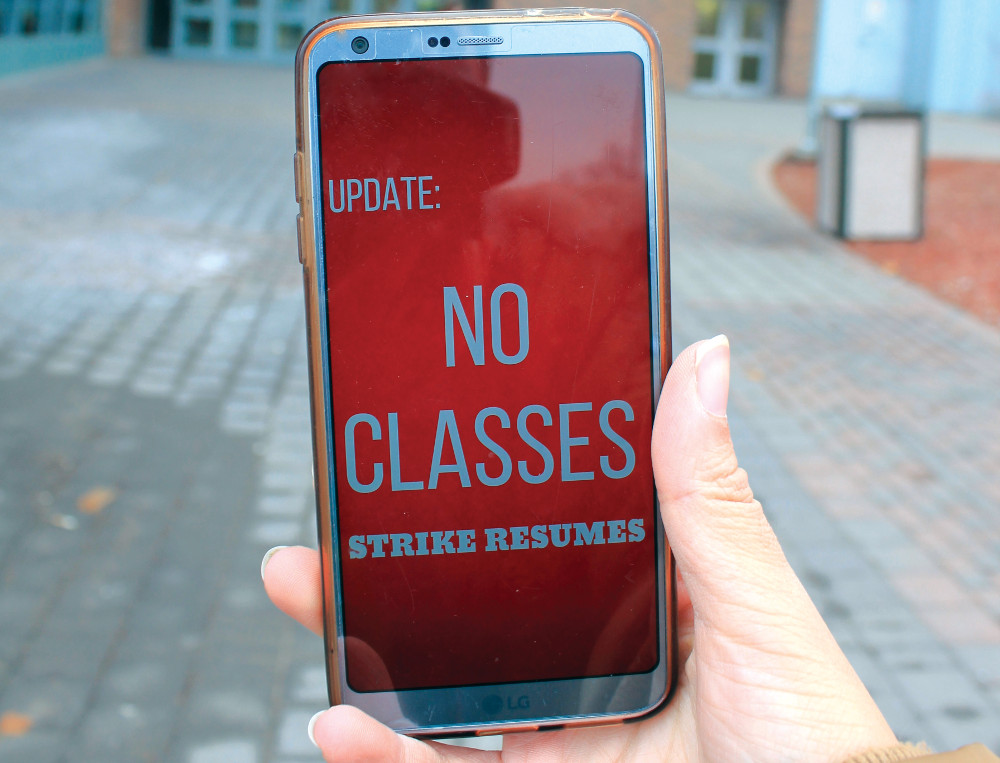Dennis Bayazitov | Assistant News Editor
Featured image: The strike has spanned nearly a full month now. | Basma Elbahnasawy
It has been almost a full month since the Ontario Public Service Employees Union (OPSEU) organizing Ontario’s 24 colleges has gone on strike. Tuesday to Thursday will see an online voting process in which OPSEU members will respond to a forced vote offer from the College Employer Council (CEC).
There seems to be a consensus within OPSEU that the offer will be rejected.
“Negotiations had been showing promise after the Employer’s bargaining team returned to their table after having left it the second week of the strike,” says President of OPSEU Local 560 (which represents full- and part-time faculty at Seneca) Jonathan Singer, an English professor at Seneca’s Newnham campus.
“To our dismay, management decided to table an offer that contained many new concessions that had not been seen before and forced a vote of the union membership on that offer.
“As soon as the union rejects that offer, I am very confident that management will remove those concessions and the Employer’s bargaining team will return to the bargaining table to negotiate the issues that matter to the striking faculty.”
Fairness for contract faculty and academic freedom for classroom decisionmaking over students’ education remain OPSEU’s top priorities.
“A forced vote is when our bargaining team does not think this is a good offer and therefore is not recommending it to us,” clarifies OPSEU local steward Anna Ainsworth, a professor with Seneca at York’s School of English and Liberal Studies. “The Employer has the ability to—once, only—force us to vote on the offer.”
Ainsworth elaborates that all OPSEU members are urged to reject the offer, because “it is a bad offer that has significant concessions and would undermine our ability to represent our members and our ability to have more full-time hires in the college system, which was the biggest reason we went on strike.
“The overwhelming majority has expressed a desire to reject the offer,” she says.
Meanwhile, Seneca at York students grow more frustrated with their deprived education.
“Being a new student at Seneca, it is really frustrating and disappointing for me that the strike is happening,” says Adeeba Hayee, a first-year Seneca at York Arts and Science university transfer student.
“When the strike started, I thought that it would be for just four or six days, but I never imagined that it could be even longer than a month.
“I can feel how much stuff we needed to cover in these days, and I am just scared of how we are going to complete everything—which we were already supposed to—when our professors return.”
Jeffrey Chen, a fellow first-year Seneca at York student studying Graphic Design, reflects similar thoughts. “I want to go back to school and finish everything as soon as possible, because I don’t want the strike to delay the second semester,” he says. “I want to graduate as soon as possible.
“The strike doesn’t affect me much—it just delays everything. Not much of an effect, it’s just pretty boring.”
Still, some use this time to their advantage. “The strike hasn’t affected me directly, but I do utilize the lack of traffic in the Seneca building as my personal study hall,” says second-year York Biology student Mehdi Kermally.
“The silence increases my ability to focus.”
Additionally, there does appear to be some hope of reimbursement for affected students.
“The Ministry of Higher Education ordered colleges to set up a student hardship fund using money saved from the strike,” reports Local 560 King Steward Tim Ayerst, a Seneca professor with the Social Work department. “All of our salaries are going to our students who are in hardship—given that they pulled the plug on something they should have done in September.”
Ainsworth notes everything hangs on whether or not both sides return to the table. “At this stage in the bargaining process, the CEC has walked away from the bargaining table twice now.”
“I genuinely believe ending the strike sooner than later is absolutely possible,” Singer adds.
“Rejecting the offer certainly does not mean the strike will continue indefinitely.
“Rejecting the offer means that management will be compelled to negotiate in good faith and come to an agreement all sides can live with. This is not a difficult thing, in my opinion, to accomplish.”
The College Employer Council could not be reached for comment.
With files from Basma Elbahnasawy




